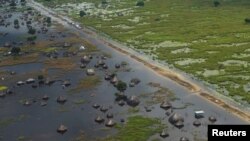JUBA – James Wani Igga, South Sudan’s vice president in charge of the economic cluster, said a World Bank grant of $215 million would be used for the "removal of debris and weeds" from bodies of water that might have shifted and need cleaning or clearing. It also will be used for measures to address the effects of climate change.
The grant is part of a World Bank-funded regional Climate Resilience Project, aimed addressing climate-change related issues in eastern and southern Africa.
Firas Raad, the World Bank country manager in South Sudan, said the project's objective is to support flood-risk management in selected river basins throughout the country.
The project also seeks to equip South Sudan with tools and knowledge for managing water resources.
Raad outlined the interventions the funds would support, including transforming water-resource management, strengthening institutions, and enhancing disaster-risk management and early warning systems.
Pal Mai Deng, South Sudan's minister of Water Resources and Irrigation, said the climate change crisis has led to massive displacement, agricultural destruction, livelihood losses, and disease outbreaks.
“While South Sudan has water resources potential, water security for people, production and protection is usually inadequate,” Deng said.
Deng pointed out that only 40 percent of the population has year-round access to water, creating to severe health risks for many.
Joseph Africano Bartel, the undersecretary in the Ministry of Environment, emphasized that addressing the climate-change crisis in South Sudan requires adaptation policies. According to a study by his ministry, the country needs $100 billion in funding between now and 2030 to tackle climate change.
“We need to get more climate finance to be able to adapt, build resilience and mitigate the impact of climate change,” Bartel said.
A Juba-based policy analyst at Ebony Center for Strategic Studies said developing strategic policies in South Sudan can guide water-resource management effectively.
Justine Machien Luoi said more efforts need to be directed in areas of “documentation, data collection, and constant analysis” in the water sector to develop better policies for water resource management in the country.








Forum